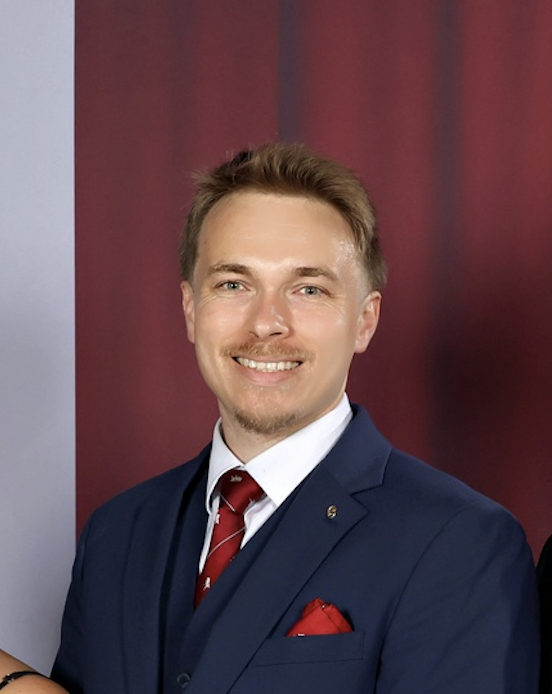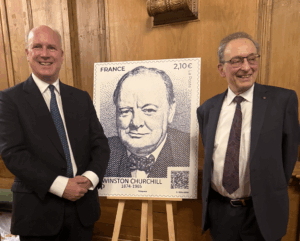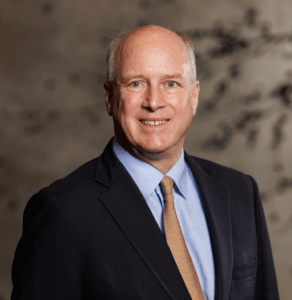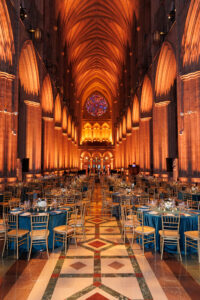Bulletin #210 — Nov 2025
Why Churchill Matters

November 10, 2025
Becoming A Leader: One Churchillian Fellowship at a Time
By WILLIAM MAYER
The National Churchill Leadership Center (NCLC)’s Churchill Fellowship Program is a monumental opportunity for young Churchillians and future leaders to expand their education, personally and professionally grow, and develop their own perception of effective leadership in the 21st century. I was fortunate to receive this generous fellowship opportunity in the fall of 2019 which funded an extensive research trip in England and Fulton, Missouri for my master’s thesis on Winston Churchill’s heroes and role models.
Titled The Mirror and the Lantern, my thesis examined the evolution of Churchill’s leadership paradigm as he assumed the premiership in May 1940. Drawing on extensive primary sources from the Churchill Archives in Cambridge, I developed a framework that traced how his early life and prewar experiences shaped his conception of effective leadership. From there, I explored a central question: Who inspired Churchill? To answer this, I analyzed several of his most significant historical models, excluding familiar familial figures like Marlborough and his father, to understand the traits he sought to emulate. Georges Clemenceau influenced Churchill’s wartime decisiveness and belief in leading from the front; Napoleon Bonaparte imparted the revolutionary conviction to defend liberty against tyranny; and Admiral Horatio Nelson embodied the courage and resolve that inspired endurance in the darkest hour. Together, these figures, combined with Churchill’s own life experiences, helped forge the leadership model that would define him during the Second World War.
The fellowship profoundly shaped the development of my thesis. Traveling to historic sites and immersing myself in Churchill’s world provided an unparalleled perspective on his leadership, one that no amount of secondary research could replicate. Few students can say they discussed Napoleonic influences with Andrew Roberts over a bottle of champagne, yet such moments captured the fellowship’s unique spirit of mentorship and discovery. It also allowed me to forge meaningful connections within the wider Churchill community, including working closely with distinguished historians Allen Packwood and Tim Riley. More importantly, the fellowship broke down barriers that often prevent young scholars from engaging deeply with the International Churchill Society. At thirty years old, I remain something of an outlier at the annual conference, but as we move further into the twenty-first century, it is vital that more young leaders step forward to carry Churchill’s legacy into the future.
My journey has not been Churchillian by any means; I had no Jennie to propel me to the House of Commons. After completing my thesis, I entered the world of retail and customer service, first at Whole Foods Market and later at Target. While it may not sound grand, these experiences offered an honest opportunity to apply the leadership lessons I had drawn from Churchill. Each day brought challenges to confront, solutions to craft, and teams to inspire. I sought to lead with courage, build trust, and encourage those around me to be their best selves. Whenever difficulties arose, I often recalled how Churchill might have approached the moment and drew upon the key insights from my research to guide my actions.
After three years of refining my own leadership paradigm, I joined the U.S. Department of State at the National Foreign Affairs Training Center (NFATC), where I now work to ensure our future diplomats are equipped with the knowledge and skills to serve as effective agents of diplomacy worldwide. By what felt like a divine twist of fate—almost Churchillian—I soon met Adam Howard, then the Department’s Chief Historian and now Executive Director of the International Churchill Society.
In late 2023, I learned that Adam was leading tours of Navy Hill, a small annex across from the Main State building in Washington, D.C. Though modest in size, Navy Hill holds a remarkable history from the discovery of the Martian moons to the founding of the Office of Strategic Services during the Second World War. After attending one of Adam’s tours, I volunteered to help coordinate them so that fellow State Department employees could better appreciate the history surrounding them. The response was overwhelming: over 500 employees registered for the first call, and since then, I have organized more than 100 tours in partnership with the Office of the Historian.
At the time, Adam had no idea I was a Churchill Fellow, which made it more meaningful when I learned of his new role at the Society. It felt as though Churchillian fate had once again intervened—bringing us together to help carry the torch of his legacy forward and inspire the next generation to keep calm and carry on. Now reconnected with the ICS, I look forward to engaging with my alma mater, sharing my fellowship journey, and inspiring future leaders to carry Churchill’s legacy forward.
Subscribe
WANT MORE?
Get the Churchill Bulletin delivered to your inbox once a month.






